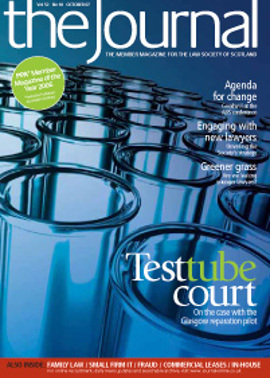Does justice need fixing?
So where do we go from here? Following on the collapse of the “World’s End” murder trial we have the Lord Advocate telling the Scottish Parliament that if the Crown had had a right of appeal against a judge’s decision to hold that there was no case to answer, then she would have exercised that right in the “World’s End” case. And we have the old chestnut of the so called double jeopardy. Can someone who has been acquitted of a crime ever be tried again for that same crime?
Should the Crown have a right of appeal against a judge’s decision to uphold a “no case to answer” submission? An accused person can appeal a decision that has gone against him – but that will only be after conviction. The right to make a “no case to answer” submission is a fairly new one – from 1980. Clearly Parliament (the United Kingdom one at that time) did not consider it appropriate for the Crown to have a right of appeal.
Is there really a problem that needs addressed? I do not know how many successful “no case to answer” submissions are made each year, and I do not know how many of those would be appealed by the Crown, if they had a right to do so. I can only go on my own personal experience and hearsay (and probably apocryphal hearsay at that) from professional colleagues. My own feeling is that there are more unsuccessful submissions that should succeed than successful ones that should not. There is a real sense that judges are far happier leaving the ultimate decision to the jury – after all, that is what they are there for. Some of us are old enough to remember so called strong judges of the 60s and 70s who would not allow cases to go to a jury if they did not think that the evidence was of sufficient character, quality and strength, even though there might have been a strictly legal sufficiency. That does not happen nowadays.
What really bothers me is the kneejerk reaction. Someone who should have been convicted has got off; therefore, the law has to be changed. Let’s get back to basics. We have a great criminal legal system. It is the envy of many other jurisdictions. Our starting point, and we must never forget it, is the presumption of innocence. It is for the prosecution, the Crown, to rebut that presumption. If they fail to do so, that is an end of the matter. How many chances have we to allow them? Since time immemorial our system of justice has said only one. Long before “human rights” were even thought of, our system of justice protected the rights of the individual. The Crown has one chance to bring an accused person to trial, and if they do not succeed, that is that. Everyone, especially the accused person, knows where they stand. There is finality. Even accepting that the “World’s End” trial judge got it wrong (which I do not, as I do not have enough information to come to that conclusion), do we have a problem, namely a system of justice that systematically lets guilty people get off? I think not. Therefore I see no need to change our law or our practice just because some people think that one judge made a wrong decision.
I have already made a comment about the Crown having one, and only one opportunity to bring an accused to trial, and generally I agree with that as a basic principle. However, I accept that there are advances in modern science and technology, particularly in the area of DNA, which bring a new dimension. Convicted persons can bring appeals based on new evidence. If we have what is called equality of arms, should the Crown not be allowed to bring a second prosecution when new evidence appears? That could be the thin end of the wedge. Once you allow it in, where does it stop? On the other hand, if it was your loved one who had been murdered, and an accused had been acquitted, and then new evidence became available implicating the same accused, what would your view be? As I have said, however, to go down that line could be the thin end of a very large wedge. Before we start changing our law, let us be satisfied that there is a serious problem that keeps recurring and that needs addressing.
If it ain’t broke, don’t fix it!
In this issue
- Advocacy in mediation
- Your voice will count
- Does justice need fixing?
- A case for trial?
- The tide for change
- New lawyers for all
- Leaving the profession
- Three proposals
- Options ahead on standards
- Know the need, know the cure
- The file at your fingertips
- Fraud: making your strategy work
- A wider view
- Pub games reborn
- Working with OSCR
- Goal to Leeds
- "We're all doomed" - or are we?
- Website reviews
- Book reviews
- Out of my depth?
- Court bars in-house privilege
- Leases: the war is over?
- ARTL picks up speed






